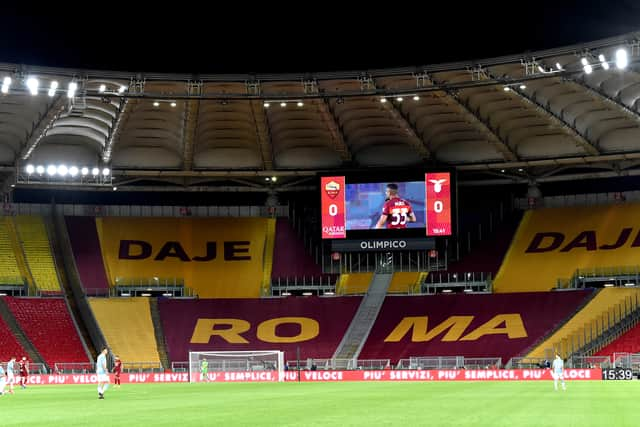Newcastle United owners PIF eye £768m investment that works against UEFA rules after Aston Villa change
and live on Freeview channel 276
The Saudi Arabian Public Investment Fund, owners of Newcastle United, have been linked with a potential takeover of Serie A side AS Roma.
According to LaRepublica, Roma's owners The Friedkin Group are considering selling the club amid Saudi interest. PIF are understood to be one of two parties interested in the purchase of the Italian club with Saudi private investor Turki Al-Sheikh the other.
Advertisement
Hide AdAdvertisement
Hide AdA £768million offer claimed to have been tabled by PIF as well as a £256million investment into the construction of Roma's new stadium. The Friedkin Group's preference would be to maintain a stake in the club but the two interested parties are reported to be standing firm in wanting a 100% share.
Italian football has strong links to Saudi Arabia with three of the past five Italian Super Cup finals taking place in the Kingdom. Roma also travelled to Saudi Arabia for a friendly match against Al Shabab last month.
Roma finished 6th in Serie A last season while also reaching the Europa League final. They were the winners of the inaugural Europa Conference League back in 2022 and have advanced to the knockout round play-offs of this season's Europa League.
Roma haven't won a league title since 2000-01 with just four clubs, Inter Milan, AC Milan, Juventus and Napoli winning Serie A over the past 20 years.
Advertisement
Hide AdAdvertisement
Hide AdPIF have invested significantly in football over the past few years with the £300million takeover of Newcastle United and subsequent investments into the club as well as acquiring a 75% stake in four Saudi Pro League clubs Al Ahli, Al Ittihad, Al Hilal and Al Nassr. Without financial restrictions in the Saudi Pro League, the PIF-owned clubs have been able to attract some major footballers to the country, including Cristiano Ronaldo, Neymar and Karim Benzema to name a few.
A takeover of AS Roma by PIF could have potential repercussions for Newcastle United should the clubs end up participating in the same UEFA competition. Since the 2000-01 season, UEFA rules have prevented two clubs directly or indirectly controlled by the same entity or managed by the same person to compete in the same competition.


This rule has been tested in recent seasons, most frequently by RB Leipzig and Red Bull Salzburg. Both clubs were initially prevented from competing in the Champions League in 2017 before the clubs submitted evidence to UEFA showing changes had been made to the governance of the two clubs so that they operated independently and without any control or influence between them.
Premier League sides Brighton and Aston Villa were also investigated by UEFA after qualifying for European football. Brighton and Belgian side Union Saint-Gilloise qualified for the Europa League under the ownership of Tony Bloom.
Advertisement
Hide AdAdvertisement
Hide AdAhead of the new season, Bloom reduced his stake in the Belgian club with Alex Muzio becoming the new majority owner. There was a similar situation with Aston Villa and Portuguese side Vitoria both qualifying for the Europa Conference League under the ownership of holding company V Sports.
Ahead of the new season, V Sports reduced its stake in Vitoria from 46% to 29% to comply with UEFA regulations.
A potential issue may arise with Manchester City and La Liga side Girona who are owned by the City Football Group are both on course to qualify for next season's Champions League. It is likely City Football Group would have to reduce its stake in Girona should both teams qualify for next season's competition.
A hypothetical situation between Roma and Newcastle could prove slightly more problematic given the similarities between the two clubs in terms of revenue (Roma - £184million, Newcastle - £246million in 2022-23) and standing as well as PIF's reported plans to complete a 100% takeover of the Italian club.
